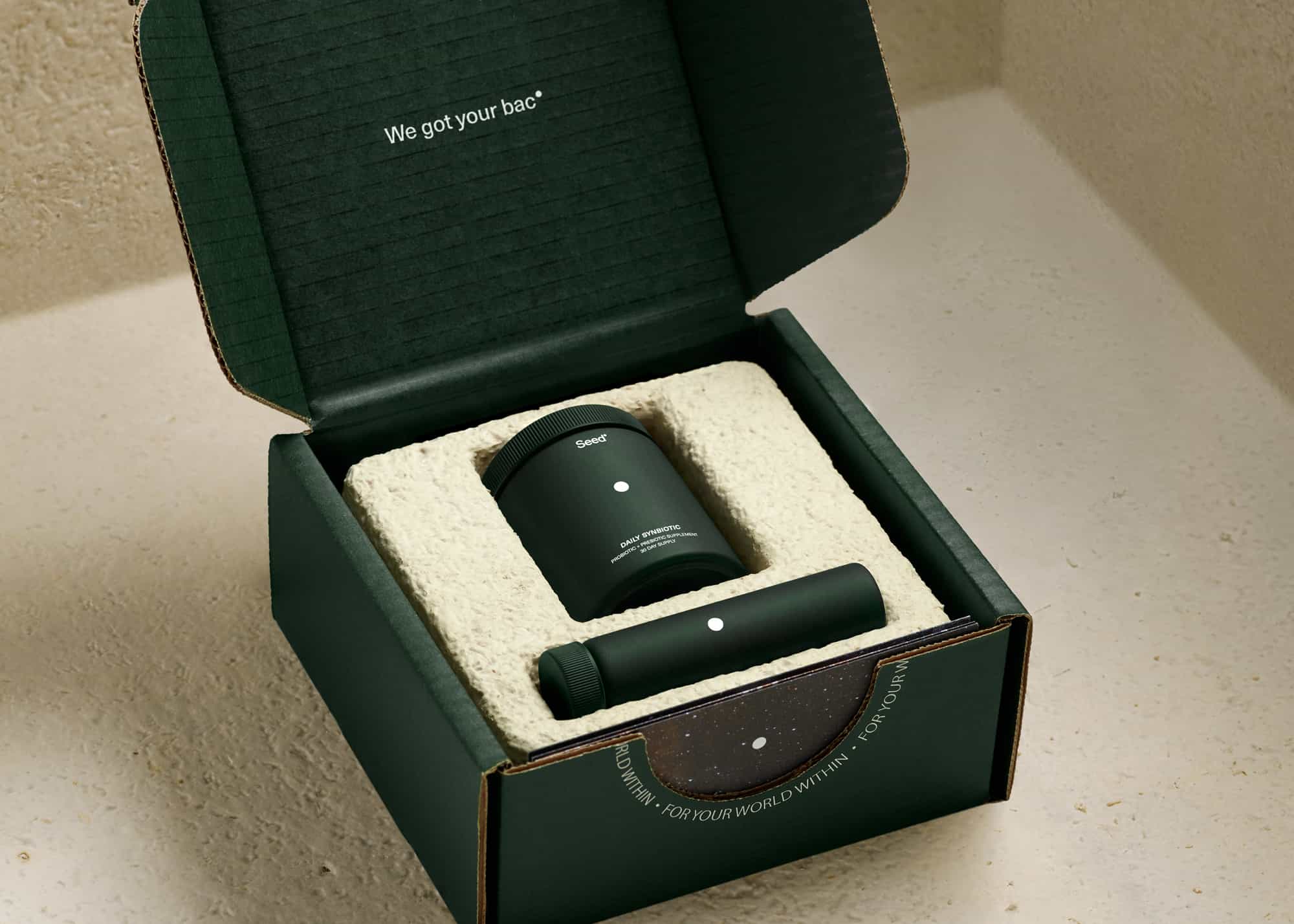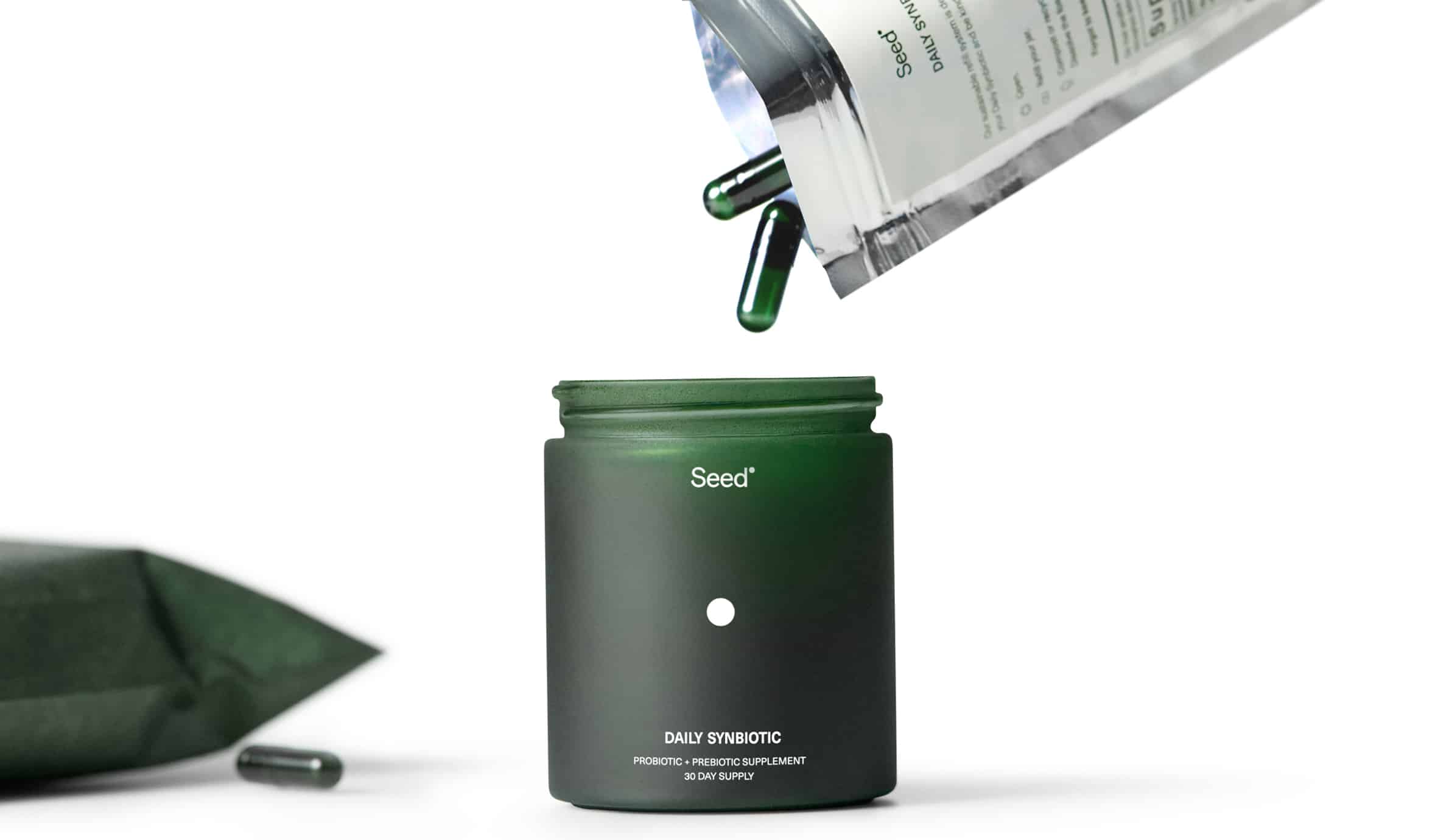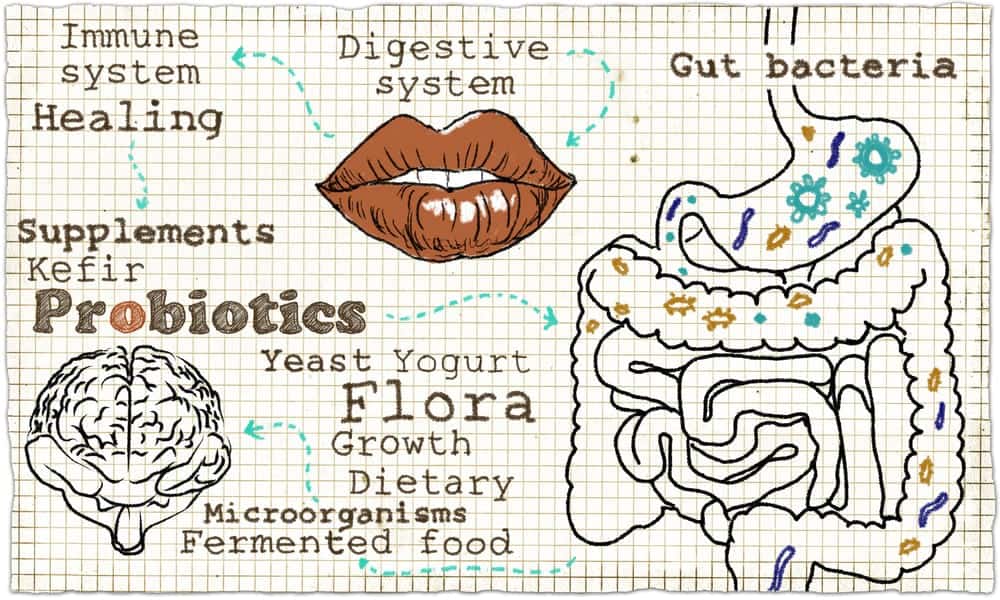Probiotics are everywhere nowdays. And it understandable why–one of the most important discoveries of our generation is the human microbiome, a network of trillions of bacteria that are contained within our body. And this network of bacteria within our body is massive. But what is real and what is hype in terms of marketing probiotics? You’ve trusted Mamavation to bring you topics like best & worst air purifiers, best & worst collagen, & best & worst cookware, join us for the top 5 myths about probiotics. Stick around to the end where we show you our favorite probiotics.
Disclosure: This post contains affiliate links.

Table of Contents
Humans Are More Bacterial DNA Than Human DNA
We are actually more bacterial DNA than human DNA. It’s estimated there are 39 trillion bacterial cells and about 30 trillion human cells inside your body at any given moment give or take the seasons. And through the National Institutes of Health Human Microbiome Project much has been discovered that we didn’t know before about how your gut affects your overall health.
For instance, your gut has the ability to affect your mood, regulate your immune system, support your metabolism, help you sleep as well as being linked to things like brain diseases, IBS, type 1 diabetes, Hashimoto’s, Crohn’s and ulcerative colitis.
But as we are learning about the human microbiome, there have been several myths and mistruths created in order to sell products to improve your health. Are you curious in finding out if you’ve been duped?
Myth # 1: A probiotic needs to be refrigerated to be a “good” probiotic
False. Though it’s common to find probiotics in the refrigerated section of the grocery store, refrigeration is not an indication of a good quality probiotic.
In fact, it’s actually a sign of a very weak probiotic. If your probiotic cannot survive at room temperature without falling to pieces, then how do you think it will survive in your 98-degree body, much less through your harsh, extremely acidic digestive tract?
Short answer: it won’t.
The first important feature of a probiotic is that it is proven to survive passage through the stomach acid and the small intestine to get to the site of action. If it arrives to the site of action dead, it’s not a true probiotic.
 Myth # 2 What you see on the label is what you get in the capsule
Myth # 2 What you see on the label is what you get in the capsule
Not necessarily. A study University of California San Diego found that only 1 in 16 bottles of probiotics actually contained the strains and the potency listed on the label. Think about that, 15 out of 16 products tested had different bacteria in the capsule than what was claimed on the label.
That means you have no idea what kind of bacteria you are putting into your body and the companies making the product have no idea what bacteria they are working with. I’m a mom of a child with food allergies and that is a very frightening proposition.
Unless the company producing your probiotics conducts DNA verification on their product after manufacturing, there is no guarantee that you will receive the strains listed on the label.
So look for products that call out DNA verified.

Myth #3. You need to rotate your probiotics to create diversity and maintain efficacy
False. The idea of rotating probiotics originated from the realization that many probiotics stop working after a month or two of use – the reason being that most probiotics are too weak to cause any lasting change in the gut.
Instead of trying to “surprise” the gut with a new probiotic cocktail every month, you’re much better off finding an effective probiotic and sticking with it.
A truly effective probiotic will not stop working after 1-2 months of taking it.

Myth #4 . You don’t need to take a probiotic if you eat fermented foods
False. Although fermented foods can be excellent prebiotics and can provide nutritious, predigested food that feeds your gut bacteria, they don’t create lasting ecological change in the gut and do not deliver living probiotic cells to the large intestine.
If you can tolerate fermented foods, they are a great source of nutrients and should be consumed, assuming they aren’t yogurts and drinks loaded with sugar.
They do not however, replace an effective, gastric surviving, DNA verified probiotic.

Myth #5 A probiotic with 50 billion cells is better than 4 billion cells
FALSE. Though our society is conditioned to think that MORE is always better, this is not necessarily true. Having 50 billion CFUs in your probiotic is only helpful if you can confirm that 50 billion CFUs are surviving your digestive tract.
Unfortunately, survivability studies with some of the leading probiotics (as high as 250 billion CFUs) indicate that 99% of the strains cannot survive digestion. This shocking finding suggests that most people are paying for products with less than 1% survivability.

THE BIG REVEAL: Mamavation’s Recommendation for a Probiotic & Prebiotic in one–Seed’s Daily Synbiotic–From Leah Segedie, Founder of Mamavation.
I’ve been testing out probiotics for over a decade. They have varied in quality over the years, but last year I tested out Seed Daily Synbiotic and have noticed improvements in my gut health, energy levels, skin health, and an increase in the time it takes me to digest my food.
Seed’s probiotic is a synbiotic, combining 24 DNA verified human-based probiotic bacterial strains with a prebiotic and a strong capsule. It’s also biofermented in Europe and free of all 14 allergen classes under the European Food Safety Authority (EFSA). That means they can sell in Europe and everything they are stating is backed by science.
- What strains, not just species, are included in the formulation? Bifidobacterium longum SD-BB536-JP, Bifidobacterium breve SD-BR3-IT, Lactobacillus plantarum SD-LP1-IT, Lactobacillus rhamnosus SD-LR6-IT, Lactobacillus reuteri SD-LRE2-IT, Bifidobacterium longum HRVD90b-US, Bifidobacterium lactis RD-BS5-IT, Lactobacillus casei HRVD300-US, Bifidobacterium breve HRVD521-US, Bifidobacterium lactis HRVD524-US, Lactobacillus rhamnosus HRVD113-US, Bifidobacterium lactis SD-150-BE, Lactobacillus rhamnosus SD-GG-BE, Lactobacillus reuteri SD-RD830-FR, Bifidobacterium adolescentis SD-BA5-IT, Lactobacillus crispatus SD-LCR01-IT, Lactobacillus fermentum SD-LF8-IT, Lactobacillus plantarum SD-LPLDL-UK, Bifidobacterium lactis SD-MB2409-IT, Lactobacillus salivarius SD-LS1-IT, Bifidobacterium lactis SD-CECT8145-SP, Bifidobacterium longum SD-CECT7347-SP, Lactobacillus casei SD-CECT9104-SP
- Have these strains been clinically-studied to do something? If so, what? Seed’s Daily Synbiotic includes 24 DNA verified bacterial strains that are linked to benefits beyond digestive health, including heart health, skin health, gut immune function, reproductive health, gut barrier integrity, and oxidative stress. The daily Synbiotic also increases folate production from within the body, which is great for pregnancy.
- Are these strains included in their clinically-verified dosages? Yes
- What is the origin of the strains? Are they human, soil, animal or dairy? Human-based bacterial strains
- Have the strains been sequenced? Do you know if the strains listed on the jar or box match what is being advertised? Yes
- How do you know the probiotics inside will survive digestion and arrive where it matters–in your colon? The capsule contains a Chlorophyllin exterior which shields it from light, while the liquid prebiotic suspension acts as an additional barrier to oxygen, moisture, and heat (which bacteria are sensitive to). Seed makes public their testing from the Simulator of the Human Intestinal Microbial Ecosystem (SHIME®), which is the most difficult deliverability test simulating the human gut.
- Does it contain a prebiotic? Yes, it contains a prebiotic made from pomegranate, organic Scandinavian Chaga mushroom extract (mycelium), & organic Scandinavian pine.
- Does the product exceed FDA regulations and ascribe to more stringent global standards like EFSA (Europe) or FOSHU (Japan)? Yes, this means that all claims are substantiated.
- Has this product been tested for pesticide residue? Will the company share laboratory information or get third party certification? Yes, Seed is sharing all their glyphosate testing laboratory results. And it’s from a lab that I trust. They are non-detect, meaning they aren’t able to detect glyphosate or AMPA (a breakdown chemical) at or above 10 parts per billion, which is the lowest you can go, in their probiotic.
- Does this brand use plastic? NO, they use a dark green glass bottle. They also use compostable Mycelium Tray packaging and FSC certified boxes. Refills come in a similar fashion to cut down on waste.

Sign up for Monthly Delivery of Seed’s Daily Synbiotic
We successfully reached out to Seed to get the Mamavation community a 20% discount. Learn more about Seed’s Daily Synbiotic here. If you would like to test them out, you can sign up for a monthly membership and delivery for $49.99 per month. Click here to get 20% off your first month.
Mamavation’s Investigation of Probiotic Brands
Brands with Probiotic Strains Improving Digestive Health, Fertility, Skin Health, Metabolism & Energy Production, Heart Health, or Mood Regulation.
-Best Brands (alphabetically):
- Bio Schwartz Advanced Strength Probiotic
- Now Foods Probiotic-10™ 100 Billion Veg Capsules
- Seed Daily Synbiotic
- SmartyPants Adult Prebiotic & Probiotic Formula
-Better Brands (alphabetically):
- Accuflora Probiotic Supplement
- Amare Global Probiotics
- Bio-Kult Original (UK Version)
- Custom Probiotics Adult Formula CP-1
- Designs for Health Probiotic Synergy
- Dr. Mercola Complete Probiotics 70billion CFU
- Dr. MK–Teen/Adult Probiotics Chewable by Doctor MK’s
- Dr. Ohhira’s Probiotics Professional Formula
- Flora Adult’s Probiotic
- Garden of Life Raw Probiotics™ Ultimate Care
- Holistic Super Shield Probiotic
- Hyperbiotics Pro-15
- Isagenix – IsaBiome™ Probiotics
- Jarro-Dophilus EPS®
- Just Thrive Probiotics
- Klaire Labs Ther-Biotic Complete
- Lifeway Kefir Probugs
- MegaSporeBiotic
- Natren Healthy Trinity Probiotic
- New Chapter Probiotic all-flora™
- Organic3 GutPro Probiotic
- Phillips Colon Health Probiotic Capsules
- ProFlora 4R Probiotics
- Pure Encapsulations Probiotic 50B
- Seeking Health ProBiota Bifido – 60 Capsules
- Ther-Biotic Complete
- Truvani Glorious Gut Probiotic Capsules
- Up4 Probiotic Ultra
- Visbiome Extra Strength High Potency Probiotic
- Young Living KidScents Mighty Pro
-Unsure What’s Going On Here🤷♀️Brands (alphabetically):
- Advocare ProBiotic RESTORE™ ULTRA
- biOptimizers P3-OM Probiotics
- Country Life Real Food Probiotic Daily Powder
- CVS Health Maximum Strength Probiotic
- doTERRA DigestZen PB Assist+
- Dr. Axe (SBO) Probiotics
- Good Health Naturally Prescript Biotics (UK) (SBS)
- JayLabPro Probiotics
- Mary Ruth’s Organic Liquid Probiotic (SBO’s)
- Neora Prolistic™ Pre & Probiotic Plus Vitamins
- Nutrition Now PB8 Acidophilus
- Plexus ProBio 5
- Pro Moms Time Released, Designed for Expecting & Nursing Women
- Renew Life Daily Balance Probiotics & Organic Prebiotics
- Vitacost Generic Probiotic
- Wink Naturals prebiotic & probiotic
Some Additional Microbiome Resources
I wanted to also direct your attention to a couple of additional resources you can use to improve your health. There are several laboratory tests out that analyze your stool and gives you actionable information on how to improve your health. Here are two that I’ve found very useful:
- Ubiome–uBiome’s SmartGut™ is the world’s first sequencing-based clinical microbiome screening test, providing detailed and accurate information to help you understand your gut health.
- Day Two–Discover which foods help balance your blood sugar based on your gut microbiome
Let me know if you have tried Just Thrive or any of these microbiome tests before and what you think in the comments. And also please let me know if there are any other probiotics you like as well or have additional suggestions.


 Myth # 2 What you see on the label is what you get in the capsule
Myth # 2 What you see on the label is what you get in the capsule
 9 Reasons Why You Need a Bidet and Not More Toilet Paper
9 Reasons Why You Need a Bidet and Not More Toilet Paper
Thanks for all the great info. I recently began taking a probiotic and I must say that it has made me feel better.
I come from a marketing research background and it appears to me that the way you have included the image of the product “Thrive” seems like an advertisement which lessens the credibility of your post. Are you receiving advertising revenue from the makers of Thrive?
I used to really like the apparent objectivity of this blog and often referred clients to it, but lately it has become so obviously sales oriented with promotional material (books, events and products), I don’t really trust it anymore. It gives me the impression that you have either “sold out” to the god of revenue, or need a new marketing manager.
Hey Sarah! Not sure if you noticed but there is a disclosure right after the 1st paragraph of this post. I didn’t receive financial compensation for this post but we have worked with Just Thrive in the past with a media event that I produce every year. We have tons of scientific advisors for Mamavation and Kiran is one of them. It’s nice to have access to a microbiologist that focuses on the microbiome and all the complications around that issue. Just Thrive has given me boxes of free probiotics to test out and I have with myself, my three young boys, and husband. But to be quite honest, I have received free probiotics from about 10 different brands. I don’t work with everyone that sends me product because I have to like what they have given me and trust it with my own family. We have tried out other brands in the past and weren’t as impressed at all. When I write about a probiotic can stop working about a month later, that’s what I meant. Whether you purchase Just Thrive or another probiotic is up to you, but the two main things I’m recommending is 1. using spore technology and 2. finding a brand that is DNA certified so you know what you are getting.
Also, if you are an MLM person, note that I didn’t evaluate any MLM brands. This was only from retail brands. So if you know of an MLM brand that has those two things going for them, I’d love to hear about it. My apprehension is always can they prove what they are saying.
Very interesting information to look into further, thank you for posting.
Thanks for stopping by!
I would like you to cite the source for your claim that fermented foods offer only prebiotics, not probiotics. I have read studies that show that fermented foods such as sauerkraut and raw milk kefir, offer tons times more probiotics than any pill on the market. I am unsure why you didn’t cite your sources in this article.
I agree. Fermented foods, as I understand it, are more beneficial than most commercial probiotics precisely because they provide probiotics — with great diversity and with strains that colonize the gut rather than simply passing through. Most probiotics (even pretty good ones) have to be taken in perpetuity to be beneficial because they don’t cause any lasting change in the gut. Since the claim in this post contradicts everything I’ve ever read, a source would have been useful. Although I agree with most of your other points, that really does make your post read like an advertisement.